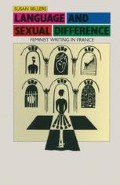Abstract
For the theorists and writers whose work is included in this book, the dominant ideology in the West is both male-determined and repressive, subordinating whatever is defined as different — other — in ways which appropriate and suppress its other status. Woman is defined in relation to man according to this schema, our difference functioning to confirm men’s position as master. In this second chapter on women and language, I turn more specifically to women’s role in language to examine, in the light of post-structural and psychoanalytic accounts of the creation of difference in language, what a ‘woman’s language’ might mean.
What can be said about a feminine sexuality ‘other’ than the one prescribed in, and by, phallocratism? How can its language be recovered, or invented? How, for women, can the question of their sexual exploitation be articulated with the question of their social exploitation? …. How can they free themselves from their expropriation within patriarchal culture?
Luce Irigaray
From the moment that she begins to speak, to exist, she has to face problems which are all masculine and this is what puts her in mortal danger — if she doesn’t use them, she doesn’t exist, if she does use them, she kills herself with them.
Antoinette Fouque
So, urgently and anxiously, I look for a scene in which a type of exchange would be produced that would be different, a kind of desire that wouldn’t be in collusion with the old story of death.
Hélène Cixous
Preview
Unable to display preview. Download preview PDF.
Notes and References
See, for example, Dale Spender’s Man Made Language, (London: Routledge and Kegan Paul, 1980).
Readers of French might also consult Marina Yaguello’s Les Mots et les femmes (‘Words and Women’) (Paris: Payot, 1978) for an interesting example of French feminist work on language paralleling Anglo-American concerns.
Jacques Lacan, ‘Le Séminaire XX’ (1972–3), in Encore, (Paris: Seuil, 1975) p. 160.
The translation is taken from Juliet Mitchell and Jacqueline Rose, Feminine Sexuality: Jacques Lacan and the Ecole Freudienne, (London: Macmillan, 1982) p. 50.
Julia Kristeva, Revolution in Poetic Language (1974), translated by Margaret Waller (Columbia University Press, 1984).
Julia Kristeva, Desire in Language: A Semiotic Approach to Literature and Art (1977, 1979), translated by Thomas Gora, Alice Jardine and Leon S. Roudiez (Columbia University Press, 1980, and Oxford: Blackwell, 1981).
Julia Kristeva, ‘How Does One Speak to Literature?’, in Desire in Language, pp. 92–123.
Julia Kristeva, ‘From One Identity to Another’, in Desire in Language, pp. 124–47.
The Kristeva Reader, Toril Moi (ed.) (Oxford: Basil Blackwell, 1986) p. 28.
Julia Kristeva, ‘Word, Dialogue, and Novel’, in Desire in Language, pp. 64–91.
Julia Kristeva, Histoires d’armour (Paris: Denoël, 1983).
Julia Kristeva, ‘Talking about Polylogue’, with Françoise van Rossum-Guyon, in French Feminist Thought: A Reader, Toril Moil (ed.) (Oxford: Basil Blackwell, 1987) pp. 110–17, translated by Séan Hand.
Luce Irigaray, ‘Questions’, in This Sex Which Is Not One (1977), translated by Catherine Porter (Cornell University Press, 1985) pp. 119–69.
Hélène Cixous, ‘Sorties’, in The Newly Born Woman (1975), with Catherine Clément, translated by Betsy Wing (University of Minnesota Press and Manchester University Press, 1986) pp. 63–132.
Catherine Clément. Miroirs du sujet (Paris: Union Générale d’Editions, 1975).
Michèle Montrelay, L’Ombre et le nom: sur la féminité (Paris: Editions de Minuit, 1977).
Danièle Sallenave, Conversations conjugales (Paris: POL, 1987).
Marguerite Duras and Xavière Gauthier, Les Parleuses (Paris: Editions de Minuit, 1974).
Monique Wittig, ‘The Mark of Gender’, in The Poetics of Gender, Nancy K. Miller (ed.) (New York: Columbia University Press, 1986) pp. 63–73.
Monique Wittig, Le Corps Lesbien (Paris: Editions de Minuit, 1973).
Copyright information
© 1991 Susan Sellers
About this chapter
Cite this chapter
Susan, S. (1991). A woman’s language?. In: Language and Sexual Difference. Palgrave, London. https://doi.org/10.1007/978-1-349-21782-3_5
Download citation
DOI: https://doi.org/10.1007/978-1-349-21782-3_5
Publisher Name: Palgrave, London
Print ISBN: 978-0-333-44944-8
Online ISBN: 978-1-349-21782-3
eBook Packages: Palgrave Literature & Performing Arts CollectionLiterature, Cultural and Media Studies (R0)

